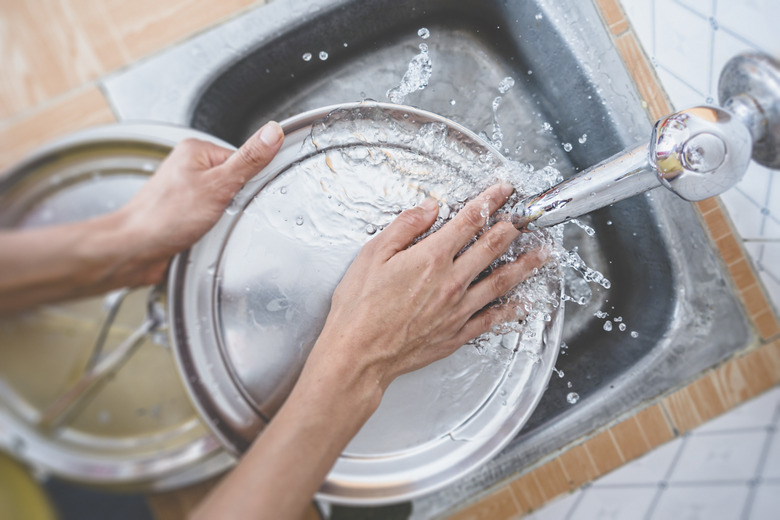How To Dilute Concentrated Dish Liquid
Almost all dishwashing liquid is concentrated to some degree, but some, such as Bio-Pac dishwashing liquid, are so concentrated the label even directs the user to "use sparingly." Concentrated soap is a good thing if you want to wash a sink full of dishes, but what if you're like the 65 percent of Dawn users, as reported by Bon Appétit, who wash plates and utensils individually? It makes sense to dilute your dish soap if you're going to put it on a sponge rather than in the sink, even if the folks at Dawn don't recommend it, but it's an approach with drawbacks.
Diluting Concentrated Dish Soap
A 25-ounce bottle of Seventh Generation dish soap costs around $3.27, and the same size bottle of Ivory, Joy or Palmolive costs even less, so diluting your dish soap isn't going to save you enough money to buy a car. If you're of the persuasion that "every little bit helps," though, Bon Appétit recommends diluting your dishwashing detergent to a 1/3 concentration. That means filling a bottle 1/3 of the way with dish soap and 2/3 of the way with water.
You can't do this in the original bottle unless you wait until you've used 2/3 of the undiluted product, so you can either store it in old dish soap bottles that you've saved, or you can dilute your soap in a plastic squeeze bottle. The diluted product may even be watery enough to spray, so you could store it in an empty window cleaner bottle and spray it on your dishes.
Reasons Not to Dilute
If you dilute your concentrated dishwashing detergent by 1/3 and pour it into a sink full of water, you're going to have to use three times as much to get the same amount of suds and the same cleaning power. You therefore won't gain much by diluting your dish soap if you're used to washing a lot of dishes in the sink.
You should dilute concentrated soap in the bottle only if you habitually clean dishes one by one, using a sponge, and even then, there's another good reason not to do it. Leaving diluted dish soap in a bottle provides a place for bacteria to grow, and if you wash your dishes with tepid or cold water, the bacteria could survive long enough to become part of your next meal. This won't happen if you wash with very hot water, because hot water kills bacteria, but people who wash dishes individually don't always wait for the water to heat up.
Storing Diluted Dishwashing Liquid
If you want to dilute your concentrated soap anyway, even though manufacturers such as Dawn don't recommend it, consider storing the diluted soap in a container smaller than the one the soap came in.
Some products, such as Dr. Bronner's Pure Castile Soap, come in 16- and 8-ounce plastic bottles. Consider purchasing one of these and using the soap in the shower as hand soap or even to wash dishes until the container is empty. Then, use that container to store your diluted dish soap. You'll use up the dish soap more quickly and give bacteria less opportunity to grow inside the container.
